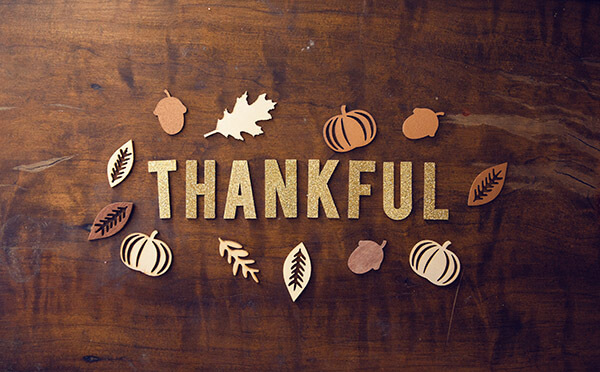The time around Thanksgiving is a great opportunity to reflect on what you are thankful for.
But don't stop there! Thankfulness is something that you can think about year round. We get so busy throughout the year and sometimes it's our closest relationships that take a hit as a result.
In this article, I present three things to consider that can help you to learn how to be more thankful in your relationships on an ongoing basis.
1. You Must Be Thankful in Your Relationship to Yourself First
We manifest and attract the energy and vibrations that we ourselves are. Sometimes it may not seem that way, especially when we seem to attract really challenging people or situations.
On some level, there is something alive in us that matches the vibrational frequency that then also comes to us.
If you want to attract and create relationships that provide you with opportunities for thankfulness, you must start by being thankful for the relationship you have with yourself. One of my favorite ways to do this is to practice affirmations, in the mirror or in meditation, that are based in radical self-love and radical self-acceptance.
"I love my body as it is."
"Thank you, body, for carrying me everywhere I go."
"I appreciate my qualities of ____, ____."
"I thank myself for my courage to face any difficult circumstance that comes my way."
Another aspect to consider is the act of thanking the darker parts of yourself – the "shadow" parts.
When something comes up that does not align with our values, highest self or desired purpose, it is so easy to judge ourselves, resist and dismiss these parts as not a part of us.
Through this, we cast away a part of ourselves and feel ungrateful for them. We view them as not belonging or welcome in our experience. This can often add fuel to those fires.
Instead, try to smother those fires with love.
Thank your pain. Thank your judgments. Thank your teachers, especially the difficult ones. Thank the angry reaction you have to the person who cuts you off… okay, I know, that one is hard. But truly, the more you thank your perceived imperfections, the more they actually dissipate and the easier this thankfulness can ripple out into your outer relationships as well.
Read: Love Yourself Fully: 6 Hacks to Self-Care

2. True Thankfulness Does not Expect Reciprocation
Remember that gratitude is not gratitude if it has an expectation to be reciprocated. Gratitude is a feeling that sparks acts of thankfulness.
If you are doing things for people to be thankful because you expect something in return, it is actually a manipulation technique – not thankfulness.
If you are acting thankful because they did something for you, then similarly, you may be acting out of your own perceived expectation or guilt.
Allow yourself to be vulnerable enough to practice thankfulness without the expectation to receive it in return.
Read: 4 Ways To Practice Gratitude

3. Saying Thank You
This one seems simple, but it cannot be practiced enough. Saying thank you can be done to carry a vibration that can diffuse anger, impatience, hostility, and a number of other intense emotions.
"Thank you," or other words, can be used to express your thankfulness for certain behaviors or for somebody's simple presence in your experience.
Tell people you appreciate them when you feel it.
There is no need to hold it in. Let it pour out.
Be courageous enough to be vulnerable by expressing your gratitude to the people that you feel it for.
Identifying specific behaviors that you appreciate in others is a great way to help a person understand their role in your life and what you value in your relationship. To go even further, you can explain why you appreciate those behaviors and what need of yours is being met through those behaviors.
Read: The Gift of Giving & The Love Languages
Thank strangers. Thank the people around you for small gestures, like holding the door open or letting you change lanes. These are times when you may not even be communicating with your words.
Whenever possible, say the words, but if not possible then a nod, bringing hands into prayer, a smile, or any other nonverbal cue can communicate your thankfulness as if you are saying "thank you."
Send the vibration of the words using your mind, and open your heart to beam love at them.
One of my favorite practices I have learned recently is the habit of saying thank you instead of sorry. It is important to consider if an apology is truly warranted because if you are not careful, this can be used as a form of spiritual bypassing, so it is important that you use this with conscious awareness.
First, notice how often you say sorry and then determine if it really is necessary. For example, you can practice saying "thank you for waiting" instead of "sorry, I'm late," "thank you for understanding" instead of "sorry, I can't make it," or even something like "thank you for giving me so much time to speak" instead of "sorry that I talked so much!"

Thankfulness Is Heart-Centered
The energy of thankfulness is one that comes from the heart. It is the expression of loving gratitude.
The more you prioritize being thankful, the more it will flow naturally towards yourself and others.
Through this, you are beautifully co-creating a more appreciative and heart-centered global community for us all to live within.
During These Times of Stress and Uncertainty Your Doshas May Be Unbalanced.
To help you bring attention to your doshas and to identify what your predominant dosha is, we created the following quiz.
Try not to stress over every question, but simply answer based off your intuition. After all, you know yourself better than anyone else.